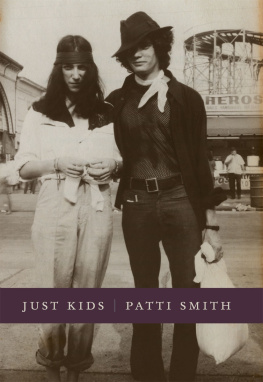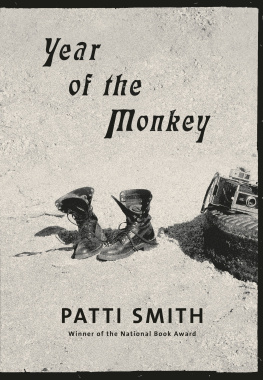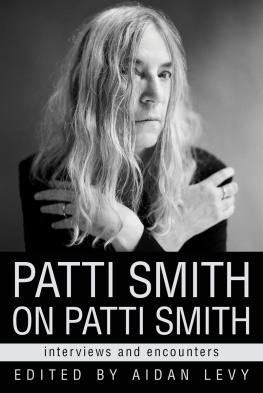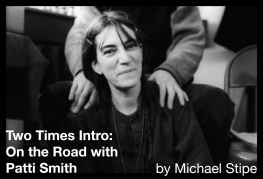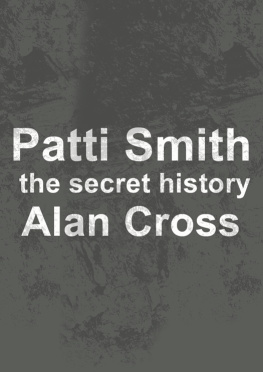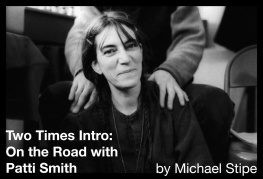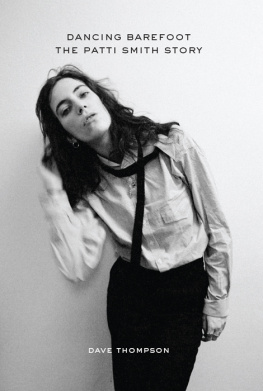DEVOTION
DEVOTION
PATTI SMITH

The Why I Write series is published with assistance from the Windham-Campbell Literature Prizes, which are administered by the Beinecke Rare Book and Manuscript Library at Yale University.
Copyright 2017 by Patti Smith. All rights reserved.
This book may not be reproduced, in whole or in part, including illustrations, in any form (beyond that copying permitted by Sections 107 and 108 of the U.S. Copyright Law and except by reviewers for the public press), without written permission from the publishers.
Yale University Press books may be purchased in quantity for educational, business, or promotional use.
For information, please e-mail (U.K. office).
Printed in the United States of America.
Library of Congress Control Number: 2017933005
ISBN 978-0-300-21862-6 (hardcover : alk. paper)
A catalogue record for this book is available from the British Library.
This paper meets the requirements of ANSI/NISO Z39.48-1992 (Permanence of Paper).
10 9 8 7 6 5 4 3 2 1
To Betsy Lerner
my friend and guide
CONTENTS
DEVOTION
Inspiration is the unforeseen quantity, the muse that assails at the hidden hour. The arrows fly and one is unaware of being struck, and that a host of unrelated catalysts have joined clandestinely to form a system of its own, rendering one with the vibrations of an incurable diseasea burning imaginationat once unholy and divine.
What is to be done with the resulting impulses, these nerve endings flickering like an illuminated map of thieving constellations? The stars pulse. The muse seeks to be vivified. But the mind is also the muse. It seeks to outsmart its glorious opponents, to rewire such sources of inspiration. A crystal stream suddenly dried. A thing of beauty joyless, defiled. Why does the creative spirit turn on itself? Why does the maker twist all drama? The pen is lifted, guided by the shattered muse. Without discord, it marks, harmony passes unnoticed, without discord, it continues, Abel is rendered no more than a forgotten shepherd.
How the Mind Works

WRITING DESK, NEW YORK CITY
1
Somehow, searching for something else, I stumbled upon a trailer of a film called Risttuules, translated as In the Crosswind. It is Martti Heldes requiem for thousands of Estonians who suffered mass deportation to Siberian collective farms in the spring of 1941, when Stalins troops rounded them up, separated families, and herded them into cattle cars. Death and exile, their fate reassigned.
The filmmaker created a visual poem through a unique dramatization of actors winding through a set of stationary human tableaus. Time suspends yet rushes, spreading images in the form of words drawn from this sad pageant. A terrible gift, I acknowledge as I write, straining to get the words down. Yet even so, I sense that behind them something else is brewing. I follow a mental line and come upon a forest of firs and a pond and a small clapboard house. This was the beginning of that something else, but I didnt know it then.
A winter sketch. Just a road away. A blue dressing gown is a curtain for a window that no one will see through again. There is blood everywhere, drained of its blood color, and a dog barking and stars dropping through pallid skies.
A dying calf. A splint upon the hoofsmears, holes. Night falls, obscuring the twitching limb of the last living thing.
A sketch on time. Gears, small hands in ice suspend. Birds no longer curious cease to wing. The dance is over and the face of love is nothing but the wide skirt and burnished heels of winter.
In the morning I awake with the black-and-white dioramas of Risttuules still in my mind, the strained tempo of the human opera embodied in bowed and breathing statues. So taken by its expressive power I cannot recall the objective of my original search. I lay there replaying a slow pan of the banished human chain winding through a relentless flurry of white petals. Chrysanthemums. Yes! Branches of them and the wretched train of life blurring past. Yet returning to the same bit of film I had viewed earlier, I find no such scene. Had I unwittingly projected it? I push aside my computer and cast a ruling upon the uneven plaster ceiling: we pillage, we embrace, we know not. I get up to urinate. I imagine snow.
With the delicate voice of Erma, the female narrator of Risttuules, fresh in my ear, I dress, grab my notebook and a copy of Patrick Modianos Paris Nocturne, and cross over to the neighborhood caf. Workers are jackhammering the street, the deafening vibrations pervade the walls of the caf. Unable to write, I read, traipsing the Nocturne networkuncertain streets, fragments of addresses, routes no longer relevant, and events that add up to a circle of nothing. I lament not writing but figure losing oneself in the energized torpor of the Modiano universe is almost like writing. You enter the skin of the narrator with his pale sense of paranoia and preoccupation with minutiae and the space around you shifts. Inevitably somewhere midsentence, I find myself reaching for my pen.
Reaching the end of Nocturne, though not really an end, as vapors of future seep beyond the last page, I reread the beginning, then fast-forward to my own day ahead. I am set to leave on the last flight to Paris. My French publisher has arranged a week of book-related events that include speaking to journalists about writing. My notebook remains untouched. A writer who isnt writing going to talk with journalists about writing. What a know-it-all, I chide myself. I have another black coffee and a bowl of blueberries. There is plenty of time and I am a light packer.
The street a construction zone, I am obliged to wait before crossing back home while a massive crane hoists metal support beams several floors above the caf, bringing to mind the opening scene in La Dolce Vita where a helicopter transports a life-size figure of Christ above the urban rooftops of Rome.
I gather my usual things for travel, setting them in a pile next to my small suitcase as I listen again to the voice-over of the trailer. The lilt of an unfamiliar language implies the saddest of melodies suffusing. As troops advance, a young mother hangs clothes and shields her eyes from the sun. Her husband is separating the wheat from the chaff, her daughter happily at play. Intrigued, I search a bit more and find a six-minute cut from Risttuules subtitled The Birch Letter. A shot of an open window, images of whiteness and birch trees emerging through whispered phrases and a train and the wind and the void.
The phone rings, breaking the spell, my flight canceled. I have to make an earlier one. I swiftly get in gear, call a taxi, slide my computer in its case, camera in a sack, and cram the rest into the suitcase. The taxi arrives too quickly as I realize I havent yet chosen what books to take. The prospect of boarding a plane without a book produces a wave of panic. The right book can serve as a docent of sorts, setting a tone or even altering the course of a journey. I desperately scan the room as if searching for a lifeline in a deep marsh. Among a small pile of unread books atop my flat files are Francine du Plessix Grays monograph on Simone Weil and Modianos Pedigree, with the astonished face of the author on the cover. I snatch them up, say goodbye to my little Abyssinian cat, and head to the airport.
Next page

